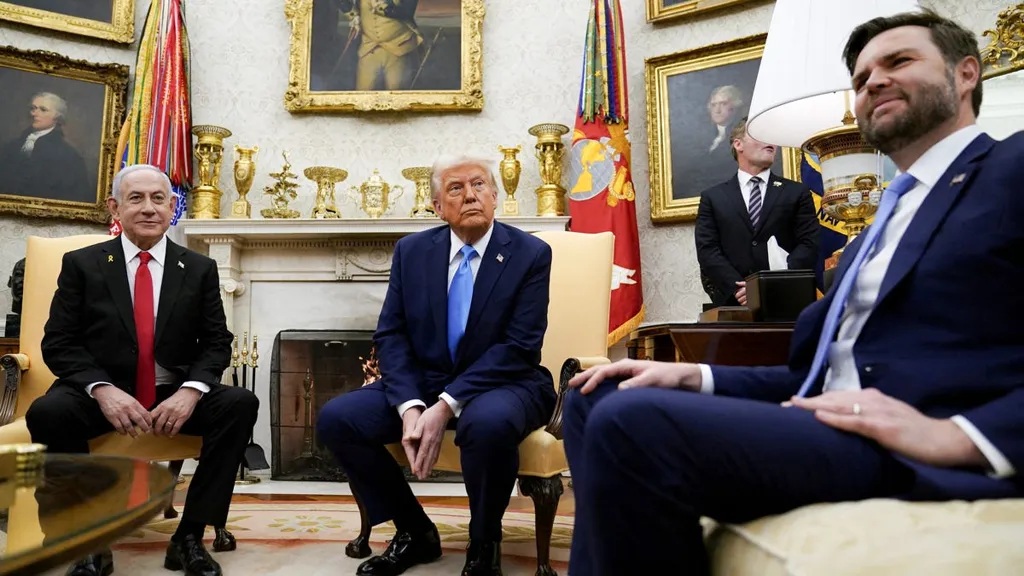Israeli officials said its military carried out strikes in southern Gaza after Hamas militants allegedly fired on Israeli soldiers.
WASHINGTON -- President Donald Trump's top messenger, JD Vance, will travel to Israel and is expected to try and rein in Prime Minister Benjamin Netanyahu while seeking to prevent the collapse of a week-old peace deal hailed as a coup for the United States in ending a brutal two year war.
But the vice president will land in fraught territory as the deal brokered by the White House hangs in the balance. The first part of the ceasefire was confined to the release of living hostages in exchange for Palestinian prisoners and flowing in of aid. Vance faces the biggest sticking point of the rest of the plan: Hamas' disarmament and Israel's full withdrawal of troops from the enclave.
It's a high-stakes gamble for the vice president with limited foreign policy experience. Vance aims to succeed in the latest chapter of a conflict that has engulfed previous American administrations.
At minimum, Vance, with the help of other Trump envoys, must convince Netanyahu's government to show restraint in responding to Hamas' provocations and ensure that humanitarian assistance makes it into Gaza, former U.S. officials say.
As questions about the future of Gaza's governance and policing remain - including Israel's own safety concerns - Vance is also under pressure to define ambitious points of Trump's peace plan.
Among them which countries will participate in the U.S.-backed Arab stabilization force that will provide support to vetted police after Hamas disarms and who will sit on the Palestinian committee that oversees Gaza.
"If there's anything short of that, and they're going to have some explaining to do," former U.S. Ambassador to Israel Daniel Kurtzer said.
A flare-up in fighting threatened to invalidate the agreement after Israel launched airstrikes on Gaza in retaliation for a Hamas assault that it said killed two soldiers.
The dispute resulted in the temporary suspension on Oct. 19 in the delivery of humanitarian aid. Israel's military said it began renewed enforcement of the ceasefire later in the day.
In response, Trump said Hamas had been "quite rambunctious" but the ceasefire remained in place.
Vance acknowledged the high-wire act on the eve of his anticipated visit, telling reporters that keeping the deal intact would be complicated and the ceasefire would be marked by fits and starts. The ceasefire will have to be monitored, he said
"Hamas is going to fire on Israel. Israel's going to have to respond of course. There are going to be moments where you have people within Gaza that you're quite sure what they're actually doing," Vance said. "But we think it has the best chance for sustainable peace."
The vice president has actively sought to increase his international exposure since entering office, making trips to Germany, Greenland, India, the U.K. and the Vatican this year.
Vance will have to do more than maintain the fragile ceasefire between Israel and Hamas. To succeed in his foray into negotiations on the international stage, Vance has to deliver where Trump has avoided going into detail.
"Showing evidence that progress is being made on the second phase begins is extremely important for the survivability of the plan," said Khalil Shikaki, director of the Palestinian Center for Policy and Survey Research in Ramallah.
The administration has to show that its plan did more than end the war and consolidate Hamas' control over Gaza, said Shikaki, a senior fellow at the Crown Center for Middle East Studies at Brandeis University.
Rather, the administration must convey that this is a short phase to be followed by others, including the creation of the apolitical committee of Palestinians and international experts that the Trump-led "board of peace" is supposed to supervise under the president's proposal.
Hamas has agreed to back away from the governance of Gaza, as Trump's plan dictates, stimulating concern about the administration's ability to pull off the second phase of his plan.
Getting Hamas to disarm will require significant pressure, said Jonathan Schanzer, executive director at Foundation for Defense of Democracies and the author of multiple books on Hamas and the Israeli-Palestinian conflict. And it will require the U.S. press Turkey and Qatar to use their leverage with Hamas, two allies that acted as guarantors in negotiations for the militant group.
For his part, Vance is expected to lean heavily on Netanyahu to respond less aggressively with Israel Defense Forces to alleged ceasefire violations.
"The message is quite simple: please don't respond with the full force of the IDF. We are still working on keeping the ceasefire intact. And basically that means asking the Israelis to do the United States a solid," Schanzer said.
Vance's visit to Israel ratchets up the level of involvement from the Trump administration in talks at a crucial moment, and as the president turns his attention to resolving the conflict between Russia and Ukraine and a trade dispute with China.
Trump is expected to travel to Asia this month and says he'll meet with Russian President Vladimir Putin in the coming weeks in Budapest.
Negotiations in the Middle East have been led by Trump special envoy Steve Witkoff and Jared Kushner, the president's son-in-law and the author of his first-term Middle East peace plan.
Netanyahu notionally agreed to the 20-point plan during a White House visit at the end of September. The deal received Israeli government backing after Witkoff and Kushner pressed Netanyahu's security council to accept it during a presentation earlier this month.
It now falls to Vance, who has been increasing his presence on the world stage, to convince Israeli officials to move on to the next phase.
"It's going to require significant U.S. engagement for this to succeed," said Kurtzer, a former ambassador to Israel and Egypt who represented the U.S. in talks between Israel and the Palestinians in a previous administration. "It will not happen on its own."
Francesca Chambers is a White House Correspondent for USA TODAY.
